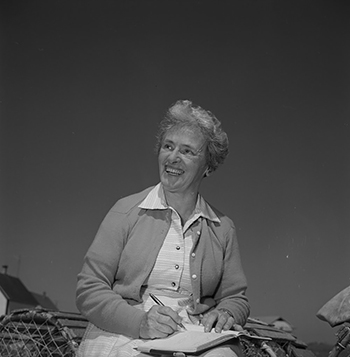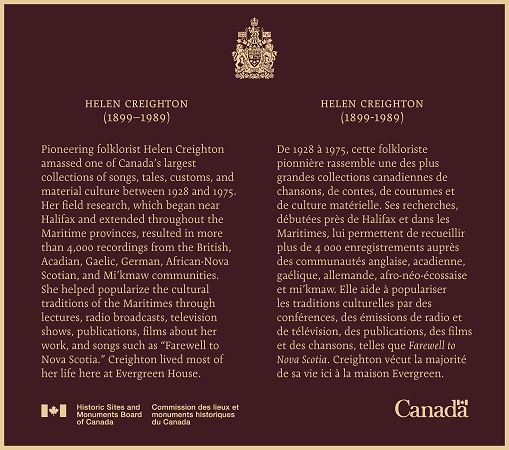Helen Creighton National Historic Person (1899-1989)

© Library and Archives Canada/National Film Board fonds/e011177105
Helen Creighton was designated a national historic person in August 2017.
Historical importance: Pioneering folklorist Helen Creighton amassed one of Canada's largest collections of songs, tales, customs, and material culture between 1928 and 1975.
Commemorative plaque: 26 Newcastle Street, Dartmouth, Nova Scotia
Pioneering folklorist Helen Creighton amassed one of Canada's largest collections of songs, tales, customs, and material culture between 1928 and 1975. Her field research, which began near Halifax and extended throughout the Maritime provinces, resulted in more than 4,000 recordings from the British, Acadian, Gaelic, German, African-Nova Scotian, and Mi'kmaw communities. She helped popularize the cultural traditions of the Maritimes through lectures, radio broadcasts, television shows, publications, films about her work, and songs such as “Farewell to Nova Scotia.” Creighton lived most of her life here at Evergreen House.
Helen Creighton
Helen Creighton devoted her life to preserving and promoting Nova Scotia's unique folk culture. A pioneering collector of Maritime folk music, her ethnographic activity between 1928 and 1975 documented the folklore of Nova Scotia on a scale previously unseen. It resulted in one of Canada's largest collections of songs and spoken traditions, with over 4,000 songs gathered from Nova Scotia's Gaelic, Acadian, Mi'kmaw, English, German, and African-Canadian populations. Creighton was among Canada's most successful promoters of Nova Scotia's traditional cultures of the 20th century. Her published collections, lectures, radio broadcasts, television shows, and film projects helped to diffuse and popularize the cultural traditions of the peoples of Nova Scotia, in a way that has found enduring resonance in Nova Scotia and throughout Canada.
Mary Helen Creighton was born in Dartmouth and studied music at university. In the early 1920s, Creighton became a freelance journalist, writing for Mayfair, Saturday Night, the Montreal Star, and the Toronto Star Weekly, among other Canadian publications. She established a regional reputation as the first “Station Aunt”, on the Halifax radio station CHNS, a position in which she wrote and hosted weekly half-hour broadcasts.

It was at this time that Creighton redirected her career toward collecting folksongs, initially around Halifax. She pioneered her own successful methodology and eventually broadened the geographic area of her collection to include all of Nova Scotia. Between 1928 and the 1970s, she amassed field recordings of over 4,000 folksongs in English, Gaelic, French, Mi'kmaw, and German. She had more than 80 publications, including numerous popular song and story collections, and scholarly articles. She was also affiliated with prominent collecting institutions, such as the Library of Congress in the United States and the National Museum of Canada (now the Canadian Museum of History), for which she worked as a field researcher between 1947 and 1967.
Creighton worked throughout her career to promote Nova Scotia's folk culture for a broad public: she lectured across North America, published song collections, and hosted a pioneering radio series in 1938 and 1939 as part of the CBC Folksong Broadcasts. From the late 1940s onward, Creighton and her work were often featured on radio and television and she was the subject of three National Film Board documentaries. By the time of her death in 1989, Creighton had become an important popular cultural figure. She was decorated – the recipient of six honorary doctorates, the Order of Canada, and an inductee into the Canadian Songwriters Hall of Fame – and beloved in her home province. One of the songs she collected and promoted, “The Nova Scotia Song”, has become the province's unofficial anthem, “Farewell to Nova Scotia”.
The National Program of Historical Commemoration relies on the participation of Canadians in the identification of places, events and persons of national historic significance. Any member of the public can nominate a topic for consideration by the Historic Sites and Monuments Board of Canada.
- Date modified :